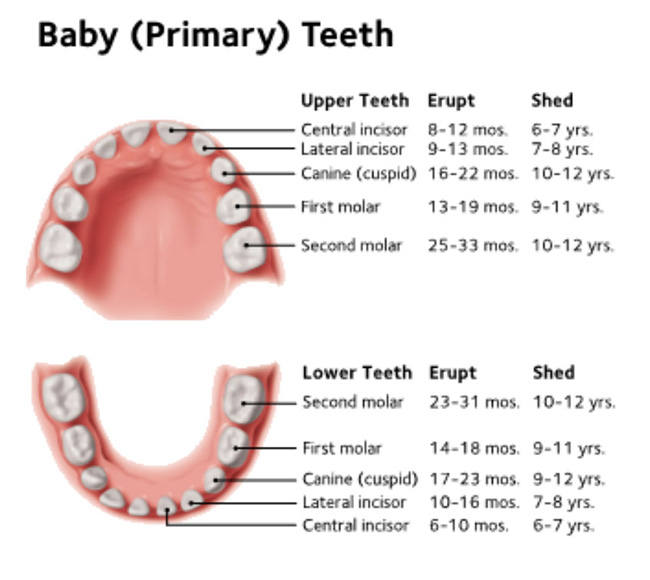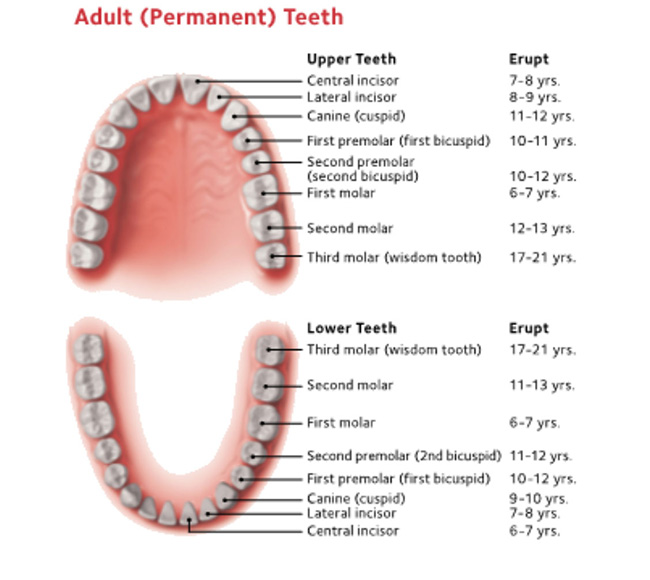- Handling Your Child's Dental Emergency
- Tooth Decay in Baby Teeth
- Your Child's Teeth
- Healthy Smiles for Mother and Baby
- Baby Teeth: When They Come In, When They Fall Out
- Your Child's First Visit to the Dentist
- Why Baby Teeth Are Important
- Your Child's Teeth: Ages Six–12
- Your Child's Teeth: From Birth to Age Six
- Your Child's First Dental Visit
The Role of Healthy Teeth in Your Child's Overall Well-Being
Maintaining good oral health is essential to your child's development. Strong, healthy teeth are critical in chewing, speaking, and smiling. Beyond these functions, teeth also help shape a child's face and ensure enough space in the jaw for adult teeth to emerge correctly. Starting at around six months of age, baby teeth begin to erupt. These primary teeth eventually fall out to make room for adult teeth. By the time a person reaches adulthood, usually around age 21, they have a complete set of permanent teeth, including the last four to appear — wisdom teeth.


Timeline of Baby and Adult Teeth
While baby teeth usually begin erupting at around six months, every child develops at their own pace. Some may get their teeth earlier or later than others, and this variability is perfectly normal. The timing of tooth eruption and loss varies from child to child, but most will start losing baby teeth between the ages of 6 and 7. During this time, children will have both baby and adult teeth simultaneously, a phase known as "mixed dentition." This can result in a smile that might look uneven, with a combination of more prominent adult teeth, smaller baby teeth, or even some missing ones. However, their smile typically balances out once all the adult teeth are in place.
Dental Growth and Development Checkup
Your child needs to undergo a dental growth and development checkup at around age seven. During this visit, the dentist will ensure that the adult teeth come in as expected and check how the teeth in the back (molars) work together. X-rays may also be taken to get a clear view of the underlying adult teeth and their alignment. If there are any concerns with tooth alignment or bite, addressing them early can lead to more effective treatment.
Transitioning From Baby Teeth to Adult Teeth
As your child grows, adult teeth start developing underneath the baby teeth. Once a baby tooth is lost, the corresponding adult tooth begins to emerge through the gums. This natural process allows for a smooth transition from primary to permanent teeth, ensuring that the adult teeth come in with adequate space. However, it's important to remember that proper dental care during this transition period is essential. Ensuring your child's adult teeth are healthy and properly aligned is critical.
Conclusion
In conclusion, the journey from baby teeth to adult teeth is a significant part of your child's overall health and development. By prioritizing regular dental checkups and instilling good oral hygiene practices, you can ensure that this transition is smooth and that your child maintains a healthy, bright smile. By fostering strong dental habits from an early age, you are laying the foundation for your child's lifelong oral health.
Visit Our Office
Office Hours
- MON8:30 am - 5:00 pm
- TUE8:30 am - 5:00 pm
- WEDClosed
- THUClosed
- FRI8:30 am - 5:00 pm
- SAT9:00 am - 2:00 pm
- SUNClosed